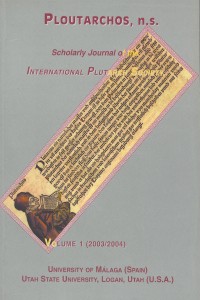Please use this identifier to cite or link to this item:
https://hdl.handle.net/10316.2/37577| DC Field | Value | Language |
|---|---|---|
| dc.contributor.author | Stadter, Philiip | - |
| dc.date.accessioned | 2015-10-21T13:07:07Z | |
| dc.date.accessioned | 2020-10-04T22:27:48Z | - |
| dc.date.available | 2015-10-21T13:07:07Z | |
| dc.date.available | 2020-10-04T22:27:48Z | - |
| dc.date.issued | 2003 | - |
| dc.identifier.issn | 0258-655X | - |
| dc.identifier.uri | https://hdl.handle.net/10316.2/37577 | - |
| dc.description.abstract | The paper presents three points about Plutarch’s pedagogy of mirroring virtue (cf. Aem. 1): 1) The Parallel Lives expect the reader to learn from weaknesses as well as strengths (cf. De coh. ira); 2) Plutarch expects his readers to distinguish what is admirable and what is not in a Life (e.g., in Sulla); 3) paralleling Greek and Roman lives heightens the mirroring effect. | eng |
| dc.language.iso | eng | - |
| dc.publisher | International Plutarch Society | - |
| dc.rights | open access | - |
| dc.title | Mirroring virtue in Plutarch’s lives by Philip Stadter | por |
| dc.type | article | - |
| uc.publication.collection | Ploutarchos vol. 1 | - |
| uc.publication.firstPage | 89 | - |
| uc.publication.lastPage | 96 | - |
| uc.publication.location | Málaga | - |
| uc.publication.location | Utah | - |
| uc.publication.journalTitle | Ploutarchos | - |
| uc.publication.volume | 1 | por |
| dc.identifier.doi | 10.14195/0258-655X_1_7 | - |
| uc.publication.section | Articles | - |
| uc.publication.orderno | 10 | - |
| uc.publication.area | Artes e Humanidades | - |
| uc.publication.manifest | https://dl.uc.pt/json/iiif/10316.2/37577/268572/manifest?manifest=/json/iiif/10316.2/37577/268572/manifest | - |
| uc.publication.thumbnail | https://dl.uc.pt/retrieve/12140736 | - |
| item.grantfulltext | open | - |
| item.fulltext | With Fulltext | - |
| Appears in Collections: | Ploutarchos | |
Files in This Item:
| File | Description | Size | Format | |
|---|---|---|---|---|
| mirroring_virtue_in_plutarchs_lives.pdf | 29.58 MB | Adobe PDF |  |
Items in DSpace are protected by copyright, with all rights reserved, unless otherwise indicated.
